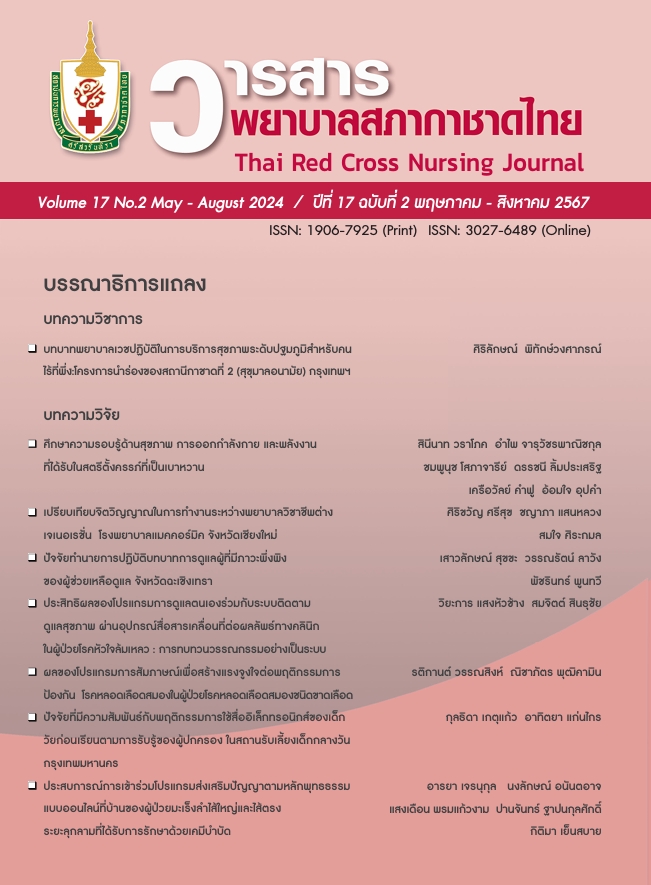A Study of Health Literacy, Exercise, and Energy Intake of Pregnant Women with Diabetes Mellitus
Keywords:
pregnant women with diabetes mellitus, health literacy, exercise, energy intakeAbstract
This survey research aimed to study the health literacy, exercise, and energy intake of 100 pregnant women with pre-gestational and gestational diabetes mellitus in four secondary hospitals in Chiang Rai province, Thailand. The instruments consisted of a personal information record, a health literacy questionnaire related to diabetes during pregnancy, an exercise interview form, and an energy intake interview form. Data were analyzed using descriptive statistics for frequency and percentage.
The results showed health literacy in the dimension of self-management was categorized as being at a good level. Meanwhile, the dimensions of access, communication skill, media literacy, cognition, and decision-making skill were categorized as being at a moderate level. In terms of exercise, 28.00% (n = 28) of samples exercised, and 5.00% (n = 5) of those exercised at least 150 minutes/week. Regarding energy intake, the mean energy intake was 1986.23 kcal/day (SD = 228.54), with mean energy intake scores during the first, second, and third trimesters of 1702.43, 1965.69, and 2006.65 kcal/day (SD = 110.39, 217.81, and 232.23), respectively. 79.00% (n = 79) of the respondents had an appropriate energy intake, and 21.00% (n = 21) had an inappropriate energy intake.
In conclusion, the study presented basic information on the health literacy, exercise, and energy intake of diabetic pregnant women; this study could help in planning care, screening, assessing, following up, and making recommendations for diabetic pregnant women to maintain an appropriate food intake to obtain sufficient energy for their needs and stage of trimester.
References
Prasitwattanasaree P. Nursing care for women with medical complications. In: Supawitpattana B, Prasitwattanasaree P, editors. Nurse and midwifery: women with risks and complications. Chiang Mai: Smart Coating and Services; 2019. p. 101-216. (in Thai)
International Diabetes Federation. IDF diabetes atlas [Internet]. 10th ed. 2021 [cited 2022 Jan 29]. Available from: https://diabetesatlas.org/atlas/tenth-edition/
Yuen L, Saeedi P, Riaz M, Karuranga S, Divakar H, Levitt N, et al. Projections of the prevalence of hyperglycaemia in pregnancy in 2019 and beyond: results from the International Diabetes Federation Diabetes Atlas, 9th edition. Diabetes Res Clin Pract 2019;157:107841. doi: 10.1016/j.diabres.2019.107841.
American Diabetes Association. 15. Management of diabetes in pregnancy: standards of care in diabetes-2024. Diabetes Care 2024;47(Supple 1):S282-94.
Wunchooserm P, Sutthiprapa A. Nurse-midwife role for promoting coping among women with gestational diabetes. Journal of MCU Nakhondhat 2021;8(10):75-87. (in Thai)
Practice Bulletin No. 180: Gestational Diabetes Mellitus. Obstet Gynecol. 2017;130(1):e17-e37. doi: 10.1097/AOG.0000000000002159.
Nutbeam D. Defining, measuring and improving health literacy. Health Evaluation and Promotion 2015;42(4):450-6.
Jangsavang S, Siriarunrat S, Tachasuksri T. Factors predicting blood glucose control behavior among pregnant women with gestational diabetes mellitus. The Journal of Faculty of Nursing Burapha University 2020;28(3):79-89. (in Thai)
Physical activity and exercise during pregnancy and the postpartum period: ACOG committee opinion, Number 804. Obstet Gynecol 2020;135(4):e178-88. doi: 10.1097/AOG.0000000000003772.
Most J, Dervis S, Haman F, Adamo KB, Redman LM. Energy intake requirements in pregnancy. Nutrients 2019;11(8):1812. doi: 10.3390/nu11081812.
Padmapriya N, Bernard JY, Liang S, Loy SL, Cai S, Zhe IS, et al. Associations of physical activity and sedentary behavior during pregnancy with gestational diabetes mellitus among Asian women in Singapore. BMC Pregnancy Childbirth. 2017;17(1):364. doi: 10.1186/s12884-017-1537-8.
Srisawad K, Panyapinitnukul C, Sonnark N. Health promoting behavior in pregnancy. Songklanagarind Journal of Nursing 2018;38(2):95-109. (in Thai)
Angali KA, Shahri P, Borazjani F. Maternal dietary pattern in early pregnancy is associated with gestational weight gain and hyperglycemia: a cohort study in South West of Iran. Diabetes Metab Syndr 2020;14(6):1711–7.
Thorndike RM. Correlation procedures for research. New York: Gardner Press; 1978.
Schulz KF, Grimes DA. Sample size slippages in randomised trials: exclusions and the lost and wayward. Lancet 2002;359(9308):781-5.
Health Education Division, Department of Health Service Support, Ministry of Public Health. Health literacy [Internet]. 2013 [cited 2022 Jan 29]. Available from: https://hed.go.th/wp-content/uploads/2024/06/ความฉลาดทางสุขภาพ.pdf (in Thai)
Limruangrong P. Management of pregnant women with overweight and obesity. In: Sindhu S, Limruangrong P, Tankumpuan T, editors. Nurse led overweight management. Nonthaburi: Thailand Nursing and Midwifery Council; 2016. p. 31-97. (in Thai)
Thitiyanviroj B, Limruangrong P, Yusamran C, Vongsirimas N, Boriboonhiransarn D. Factors predicting second trimester weight gain in overweight and obese pregnant women. Journal of Nursing and Health Care 2019;37(2):170-9. (in Thai)
Kontha J, Sangpraseart A, Pancharean S, Viboonwatthanakitt R. The influence of health literacy on self-care behaviors among pregnant women with diabetes mellitus. Journal of Nursing and Education 2024;17(1):16-30. (in Thai)
Khwanprom R, Chareonsanti J, Sriarporn P. Health literacy and exercise behaviors among pregnant women. Nursing Journal 2021;48(1):210-21. (in Thai)
Limruangrong P, Sinsuksai N, Ratinthorn A, Boriboonhirunsarn D. Relationship among selected factors, exercises, and two-hour postprandial blood glucose levels in pregnant women with gestational diabetes mellitus. J Nurs Sci 2011;29(Suppl 2):48-58. (in Thai)
Hinkle SN, Li M, Grewal J, Yisahak SF, Grobman WA, Newman RB, et al. Changes in diet and exercise in pregnant women after diagnosis with gestational diabetes: findings from a longitudinal prospective cohort study. J Acad Nutr Diet 2021;121(12):2419-28.e4. doi: 10.1016/j.jand.2021.04.014
Downloads
Published
Issue
Section
License
Copyright (c) 2024 Srisavarindhira Thai Red Cross Institute of Nursing

This work is licensed under a Creative Commons Attribution-NonCommercial-NoDerivatives 4.0 International License.
เนื้อหาบทความหรือข้อคิดเห็นต่างๆ ในวารสารพยาบาลสภากาชาดไทยนี้ เป็นความคิดเห็นของผู้เขียนบทความ ไม่ใช่ความเห็นของกองบรรณาธิการ หรือสถาบันการพยาบาลศรีสวรินทิรา สภากาชาดไทย






